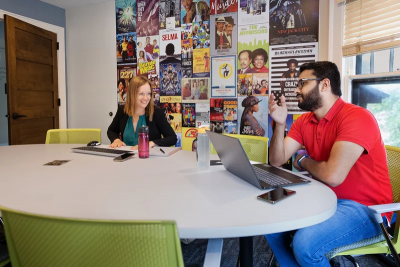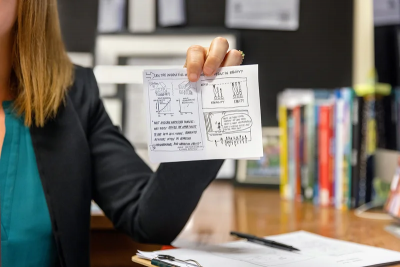Professor’s collaborative research draws on social justice issues to improve outcomes in math education.

Nicole Fonger has always loved math and its challenges. She adheres to the mantra that everyone is a math person, and she’s dedicated to exploring ways to help students at all levels grasp concepts that lead to meaningful learning. “I consider myself a theory builder,” says Fonger, an assistant professor of mathematics and mathematics education in Syracuse University’s College of Arts and Sciences and School of Education. “A lot of my scholarly contributions represent different lenses, framings or theories for how to understand and support students’ learning. That definitely drives my work. But at the same time, to me, none of that would matter if it wasn’t informed by and informing what’s happening in the classroom.”
For Fonger, the classroom is where lives can be transformed and insights can advance new pathways of learning. It’s also where, as a community-engaged and creative scholar, she has found a home for her research. Since joining the Syracuse faculty in 2017, she has forged relationships with teachers and administrators in the Syracuse City School District (SCSD). She believes strongly in partnering with teachers to link research and practice and often uses innovative approaches—such as incorporating social justice issues to improve classroom learning and employing artwork to help explain complex issues involving race, inequity and education. In her research, she often sees herself as a participant observer, collaborating with teachers, interviewing students and interacting with them in a class. “I really show up in those spaces as a learner,” she says.
Linking Research and Practice
“A lot of my scholarly contributions represent different lenses, framings or theories for how to understand and support students’ learning.”
After earning a bachelor’s degree in mathematics from the University of St. Thomas in her home state of Minnesota, Fonger taught high school math for two years in Kalamazoo, Michigan, which proved highly influential in her career. “That experience definitely shaped me, in terms of having opportunities to experiment or put theory into practice,” says Fonger, who holds master’s degrees in mathematics and mathematics education as well as a doctorate in mathematics education from Western Michigan University. “That’s a big theme of my work. But it’s also been an important grounding for my continued work and part of why I seek out teachers as collaborators and seek out classroom spaces as a place to inform change and to support meaningful learning for students.”
In 2020, Fonger was awarded a CUSE grant aimed at developing research-practice partnerships with SCSD to improve student outcomes in algebra. She involves a dedicated team of undergraduate and graduate student researchers in her work and has also received support for her research and outreach activities from the College of Arts and Sciences Engaged Humanities Network and the Central New York Humanities Corridor. At the heart of her interest is a desire to pair instruction with social justice objectives to improve equity in math education. “Dr. Fonger’s focus on outreach with Syracuse city schools has enabled important steps toward increasing equity and addressing disproportionality in the schools,” says Professor Graham Leuschke, chair of the Department of Mathematics. “She has engaged the district on ways to unlearn inequities designed into our society, including the mathematics classroom. Questions like the ones Dr. Fonger is addressing are taking on central importance in today’s society as we try to understand the ways that structural racism has shaped so many aspects of our lives.”
Bringing Social Justice to Math

Fonger’s personal outlook shifted dramatically in May 2020 when George Floyd was murdered by a police officer in Minnesota. “It really shook me to my core that I didn’t have a broad lens to see how issues of racial injustice impact all of us and also impact my work as an educator,” she says. As an example, she cites algebra as a “gatekeeper” that students must understand to advance in STEM subjects, but asks, “In a racially diverse school, why are children of color underrepresented in eighth-grade algebra?” Following what she calls a “critical self-interrogation,” she established the Antiracist Algebra Coalition. “I looked to build a team of stakeholders who were also dedicated to racial justice in mathematics and wanted to do the work together,” she says.
Fonger partnered with Syracuse community members to build the coalition and help create social justice math lessons. She teamed up with Nottingham High School math teachers Ken Keech and Betty Routhouska to introduce research-based algebra lessons that aligned with studying Black history in Syracuse. One project focused on the history of the Black community in the 15th Ward and how the Interstate 81 construction project decades ago forever changed lives and the neighborhood. Along with learning the history, the students put their algebra skills to work—finding, for instance, the equation of a line that reflected the city’s population data and using the line to chart future population trends. A modified version of the lesson was also adapted for a Syracuse University precalculus course. “I hope that by sharing this work other teachers will see the power of integrating local history, current events and math,” says Fonger, who has given numerous presentations and published creative pieces and peer-reviewed journal articles on the work, including ones co-authored with colleagues and graduate students.
In May, the coalition hosted a “A Sense of Place: Using Math to Engage in Our Communities,” a family-friendly event at Café Sankofa that invited community members to learn about the 15th Ward and other local social justice issues through interactive displays and other activities that incorporated math. The event reflected the coalition’s multifaceted goal “to educate ourselves, educate others and advocate for change,” Fonger says. “The teachers and coaches I collaborate with have been teaching and designing lessons at the intersection of social justice and mathematics, where we’re interrogating social issues through a mathematical lens.”
A Holistic Approach
“The teachers and coaches I collaborate with have been teaching and designing lessons at the intersection of social justice and mathematics, where we’re interrogating social issues through a mathematical lens.”
Fonger praises Syracuse city schoolteachers for their openness in sharing the challenges they encounter—student hunger and homelessness among them—that can weigh heavily on academic performance. Since there’s no one-size-fits-all recipe for student learning, Fonger emphasizes understanding the context in which they learn and appealing to their curiosity and interests. To create an environment where students can “relate to math in personal and meaningful ways,” she says, “you have to build trusting relationships with your students and connect with them in ways that will demonstrate this is a safe place for learning.”
Just as Fonger wants “learners to bring their full identities to the classroom,” she takes a holistic approach to her work and brings her full self. She’s a mother of three who’s devoted to her children’s schools and activities and the community’s well-being. She’s a yoga practitioner who shares breathing and stretching exercises with her Syracuse University students as a way to reduce anxieties before an exam. She’s also an artist who reflects on her personal growth and has produced a series of zines and sketchnotes—which combine visual and textual information—to both express herself and supplement her research articles. “I’ve been using visuals to communicate really complex ideas that people may be uncomfortable talking about,” she says, noting that she collaborated with administrators at Ed Smith School to create a mural-sized poster that addressed racial disproportionality in students enrolled in accelerated math.
Last year, Fonger shared her philosophy in “A Heart-Centered Stance: Receptivity to Algebra Teachers’ and Students’ Multidimensional Experiences,” which appeared in the Journal of Humanistic Mathematics. “That paper came out of my work in local schools and observing the dedicated teachers develop strong relationships with their students that were rooted in an understanding of care and an ethic of care,” she says. “I learned from the teachers and these great examples of this holistic approach to math education that we often don’t see. It inspired me to bring more of myself to my scholarship.”
In her own classroom, Fonger celebrates students’ success and seeks to build their confidence in their math skills. As a researcher, she continues to investigate ways to offer experiences and environments that produce positive outcomes. “You’re always asking questions,” she says. “And it’s those questions that keep motivating me and driving my pursuits for new knowledge.”
By Jay Cox
Originally published by Syracuse Stories.
Learn more about the School of Education’s teacher’s undergraduate and graduate teacher’s education programs in mathematics.
